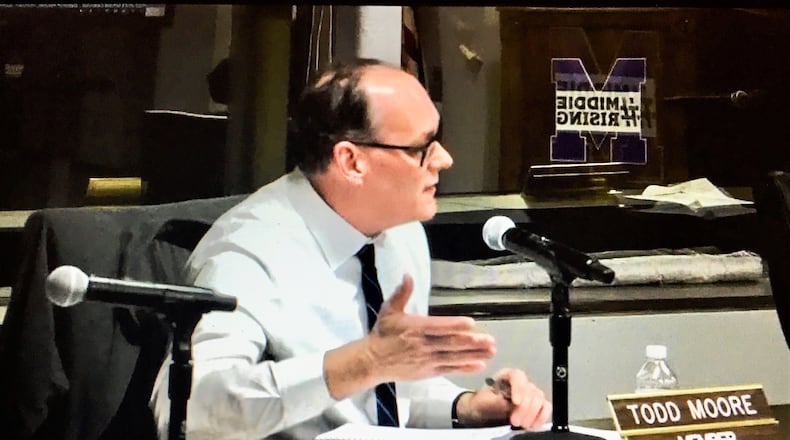These latest, wide-ranging plans included paying for new curricula and learning technology updates, career pathway learning programs for students’ education about careers, reading, English language and math recovery plans as well as expanded counseling services to offset the impacts of the pandemic.
Three of the ESSER plans proposed by Middletown Schools Superintendent Marlon Styles Jr. were approved by a 5-0 vote Monday evening.
But board member Todd Moore voted no on the fourth plan — Recovery & Extended Learning Plan — totaling $6 million of the total $11.7 million spending plan.
Moore’s complained the plan — like the other three plans — lacked details.
Moore spent most of his time during Monday’s meeting asking questions of Styles and other district officials for more information on what dollar-amount allocations were for the $11.7 million ESSER spending plan.
He complained the plan presented during the Monday meeting should have been a first-reading of the district’s spending proposal and not a time to vote.
“This is the first time we are seeing these numbers,” said Moore, who added he has “a fiscal responsibility” as a publicly elected board member to ask for more details.
“These are broad allocations without details. I’ve never been through a budget process like this.”
He warned other board members such a generalized approach may harm public confidence in the city schools.
The board and district risks “a great disconnect” with the public who want to know how the federal tax dollars are being spent, Moore said.
“I’m not trying to be adversarial here … this is my fiscal role.”
Styles and some other board members countered that an outline of the plan was presented to the board during a work session last month.
Moore told the Journal-News “there are numerous issues within the (ESSER) budget: there’s been few details about how funds will be spent. My concern is it opens the process to wasteful spending or a lack of priorities.”
But Middletown School Board President Chris Urso, who described Moore’s insistent questioning as “well-intentioned,” said a more detailed, spread sheet approach for each subsequent ESSER program allocation as they come to the board for future approval would improve the process.
“We are here to be strong fiscal stewards to our community,” Urso said.
Moore also pointed to Styles’ recent finalist candidate status for Cincinnati Public Schools’ top job as impacting public confidence.
“This is taking place, frankly, at a time when our superintendent is looking for employment. That puts a lot of folks in the community on guard, believe or not,” he said.
But fellow Board Member Anita Scheibert disagreed with Moore’s contention the ESSER spending plan lacked details.
Moreover, she said regardless of whether Styles stays or go, a strategic plan for improving the city schools will remain in place as will other veteran district officials.
“I have great confidence in the people we have hired and the decisions being made,” Scheibert said.
About the Author

